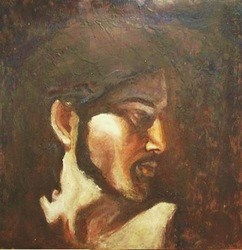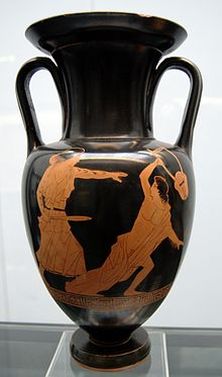
If you're just joining us, the study begins here:
In ancient Greek medicine, eight conditions of human illness are recognized. Each of the eight beatitudes describe one of these extreme conditions. The first four Beatitudes are based on an absence of air, water, fire and earth. The second four center on an excess, in the same order: air, water, fire and earth.
The Second Beatitude: "Blessed are those who mourn, for they will be comforted."
The very wealthiest and most influential in Greek society--those who excelled--the best of the best, or as they thought,the most favored by the gods--were described as "makarioi." This is the same word that Jesus used for "blessed."
The word "pentheo" describes the activity of mourners at a funeral: in ancient Greek culture, grief was a loud, vocal process. Any family who could afford them would hire professional mourners to swell the sound and ensure appropriate decibels at the death of a loved one.
When someone weeps, we get them a drink of water. Between loud continuous wailing and countless tears shed, the Greeks may have considered mourners to suffer from a lack of water .
In Greek culture, there were several versions of accounts of death and the afterlife. One of the most widespread may have been the cult of Orpheus. The myth of Orpheus says he was the greatest musician and singer in ancient history. When his bride Euridyce died on their wedding day, Orpheus was heartbroken. He was determined either to bring her back to life, or to join her in the underworld. He descended to the underworld, taking his lyre with him. He intended to use the gift of music the gods had given him to turn their hearts. Orpheus' spectacular solo won the gods over, but he was only allowed to bring Euridyce back to life one condition: he must lead her back home without turning around to see if she had followed him. In this he failed, and Euridyce was returned to the underworld.
The Greek mystery cult of Orpheus was said to involve rather elaborate rituals to ensure the safe passage of the dead to the afterlife. After cycles of thousands of years of reincarnation to purifiy the spirit's contamination by the flesh, the Greek followers of Orpheus hoped at last to become gods.
Just one of many Orphic instructions to the dead soul follows: the departed soul is instructed to call out to the keepers of the underworld, "I am a son of earth and starry sky. I am parched with thirst and am dying, but quickly grant me cold water from the Lake of Memory to drink. . ."
Jesus describes our own exchange with God as a much simpler and more direct interaction, but one that opens the way for an ongoing relationship. In answer to our mourning Jesus offers "parakaleo," the same word as used for the action of the Holy Spirit. It describes being called beside, for the purpose of offering comfort. When we cry out to God in mourning, he responds by calling us back--into his presence once again. In response to the mourners' lack of water, "The Spirit and the bride say, “Come!” And let the one who hears say, “Come!” Let the one who is thirsty come; and let the one who wishes take the free gift of the water of life."
"Antipohonal" is a term musicians may know that comes from Greek. It describes an audible signal from one party followed by an audible response from another party. Antiphony describes the action of the second Beatitude: when we mourners cry out to God, he calls back to us in turn.
The simple but unqualified condolence of Jesus seems to suggest that God matches our intensity--he misses his loved ones, too. When we are absent from him, he mourns for each one of us just as deeply as we miss our loved ones who have passed on, and calls out with the same passion as we do.
Click here for a study of the third beatitude.


 RSS Feed
RSS Feed